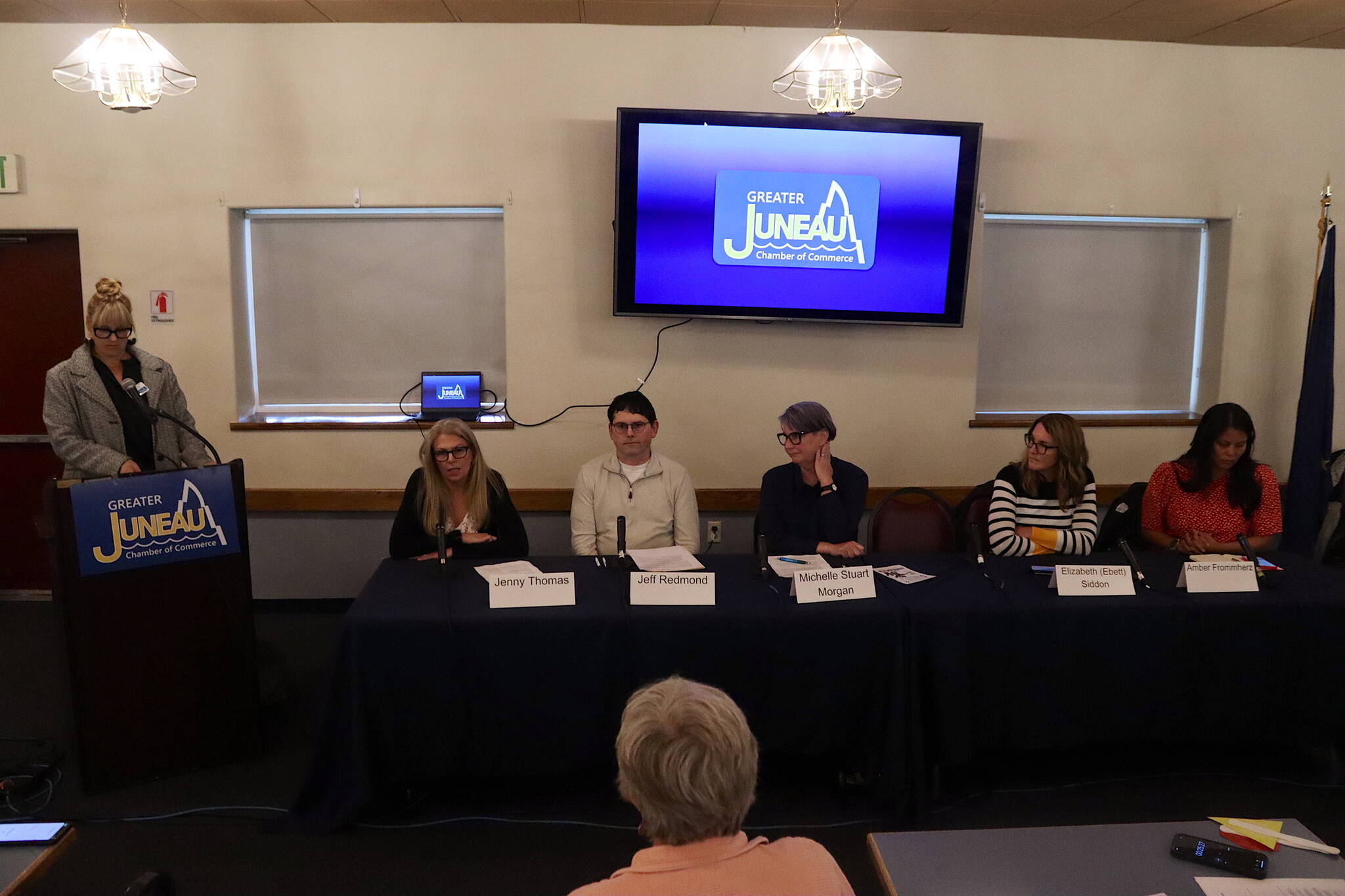One week after Juneau schools started under a drastic consolidation plan, candidates for the upcoming school board race were asked during a forum how they would avoid the budget crisis that resulted in the restructuring and how they would approach a similar crisis if one does occur.
Five of the six candidates seeking three open seats for the Juneau Board of Education in the Oct. 1 municipal election answered questions about a range of school policies during the 90-minute forum hosted Thursday by the Greater Juneau Chamber of Commerce at the Juneau Moose Family Center. Consolidation was a recurring topic for the candidates, who focused largely on process questions such as public engagement rather than specific details of the plan itself.
“We did the best we could in the time we had to get input from the community, to host forums and listening sessions and talk to different components, teachers and community members and parents,” said Elizabeth Siddon, one of two incumbents participating in the forum. “But I think what we didn’t do was tell you what we were going to do with that information.”
The consolidation plan means there is now one high school and one middle school, instead of two of each, and other adjustments have been made including putting sixth-graders at the elementary rather than middle school level.
Jenny Thomas, one of three challenges at the forum who also was a foremost opponent of the consolidation plan, said the lesson learned from the budget crisis revealed in January that resulted in the changes is “important decisions shouldn’t be rushed.”
“We need to research, communicate, get input, plan and strategize to come up with a creative solution,” she said. “Not every challenge should be treated like a crisis. We shouldn’t panic. We should take a minute and look at all of our options.”
The other challengers are Jeff Redmond and Michelle Stuart Morgan. The other incumbent at the forum was Amber Frommherz, while incumbent Will Muldoon was absent due to being the chair of the board’s finance committee which met at the same time as the forum.
Also on the election ballot is the recall of the top two school board members — President Deedie Sorensen and Vice President Emil Mackey – for their alleged “failure to understand” the budget situation leading to the consolidation, an effort spearheaded in part by Thomas.
Redmond, when asked what he would do to avoid the crisis situation the board found itself in, said more “proactive communication and community involvement” to prevent the anger that arose from consolidation.
“What I really want to emphasize in the answer, though, is to thank the people that have been working on it and to not come at them with any kind of anger,” he said. “There’s the whole recall thing and that’s not the answer. We have to work together and we have to come up with a way to move forward.”
Frommherz, as the other incumbent, said “acknowledging that we have change on the horizon” for both the district’s educational offerings and possibly the representation on the school board after the election. As such, adjusting the district’s long-term strategic plan to reflect changes is important.
A broader focus was suggested by Morgan, who said while it’s necessary to acknowledge circumstances in the district are changing and monitor such developments closely, there needs to be an aggressive push for more state funding which has remained largely flat for many years.
Candidates generally agreed on many general concepts such as seeking more state funding and better communication with the public while responding to various questions. There was divergence, however, when candidates were asked what their top three priorities are if elected.
Morgan said she wants district employees to feel they have job security in the wake of consolidation, as well as ensuring transportation and scheduling hitches are smoothed out. She also said that, as a former special education teacher, larger class sizes this year are a concern.
“I don’t know anyone in this room or myself who could teach 36 kids and have two or three of those kids need special care,” she said.
Siddon, a federal fisheries research biologist, said one of her top goals is the curriculum for sixth-grade students (especially science) following consolidation, and another is ensuring the universal free breakfast program continues to receive funding beyond the current extension to January.
Protecting students from discrimination was cited by Frommherz, singling out transgender students who have been targeted by recent statewide proposals and policies as an example. She also mentioned workplace development and community engagement as priorities.
“I think I would like to just continue fostering relationships to ensure like we have a smooth transition through this consolidation, I want to really beef up some work-based learning opportunities and I think I want to continue to stand up for our students.”
Redmond said he also sees inclusivity to ensure a safe environment for all students as a priority. Long-term budget challenges is another.
“The board’s in a bunch of trouble for transparency issues and making some decisions that the community maybe didn’t really support,” he said. “So I’m here to just bring transparency and really serve the children.”
Thomas offered the succinct answer of “communication, accountability and action.” She also said she chose to run after raising objections during the consolidation process so she can provide the latter.
“I wanted to be part of the solution and not just the problem,” she said. “If I’m going to be saying that people aren’t doing a good job, or, you know, things are wrong, I feel like I should be willing to step in and try to fix it and help it out.”
• Contact Mark Sabbatini at mark.sabbatini@juneauempire.com or (907) 957-2306.

